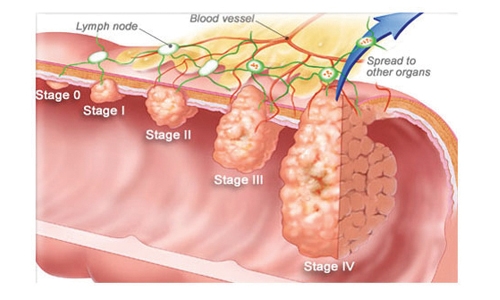Colorectal cancer on rise in Bahrain; highest in GCC
Manama : The incidence of colorectal cancer (CRC) in the Kingdom, based on the latest cancer registry cases in Gulf Cooperation Council Countries, was 40/100,000 in men and 32/100,000 in woman.
Compared to other Gulf countries, Bahrain has highest incidence rates for the disease. CRC is a disease mainly affecting middle-aged and elderly people with a majority being diagnosed after the age of 50 years.
According to the World Health Organisation (WHO) and the Centers for Disease Control and Prevention (CDC), colorectal cancer – also commonly referred to as bowel cancer, colon cancer or rectal cancer – is the second most common cancer worldwide, after lung cancer and the third most common cancer in men and women in the Kingdom of Bahrain.
CRC is a preventable and potentially curable healthcare problem, especially if discovered in the early or precancerous stages.
In Bahrain we have found out that the cost of treating CRC patients ranges from BD2,500 to BD10,000, which forms an additional burden on healthcare providers. Currently, Faecal Occult blood test (FOBT) is used to screen for CRCs despite its low (15 to 35 per cent) sensitivity.
Among causes found to contribute towards CRC are old age, high-calorie/fatty diet, obesity, smoking, physical inactivity, high alcohol intake, Crohn’s Disease and a previous history of cancer and genetics.
Professor Seamus Cowman, Head of Department of Nursing at the Royal College of Surgeons in Ireland (RCSI), said, “The nursing profession is focusing on community engagement with health promotion, which will hopefully empower people in their efforts to prevent colon cancer.”
An assessment of a New Biomarker (M2PK) test, as a potential tool in screening and early detection of CRC, is being supported by Supreme Council for Health Chairman Lieutenant General Dr. Shaikh Mohammed bin Abdulla Al Khalifa.
The focus of this project will be on screening and early detection of the disease, establishing the prevalence of CRC precursors and to recommend the age of early enrolment and national screening programme for colorectal cancer.
Signs and symptoms of CRC include a change in your bowel habits, including diarrhoea or constipation or a change in the consistency of stool, rectal bleeding or blood in stool, persistent abdominal discomfort, such as cramps, gas or pain, a feeling that your bowel doesn’t empty completely, weakness or fatigue and unexplained weight loss.
Many people with colon cancer experience no symptoms in the early stages of the disease. When symptoms appear, they will likely vary, depending on the cancer’s size and location in the large intestine.
The best preventative is a colonoscopy (via camera) to check for polyps or abnormalities – it is generally advised to have one every five years after the age of 50.
“Regular colonoscopies may cut colorectal cancer risk by 40 per cent,” said a source from the International Hospital in Budaiya.
Related Posts

